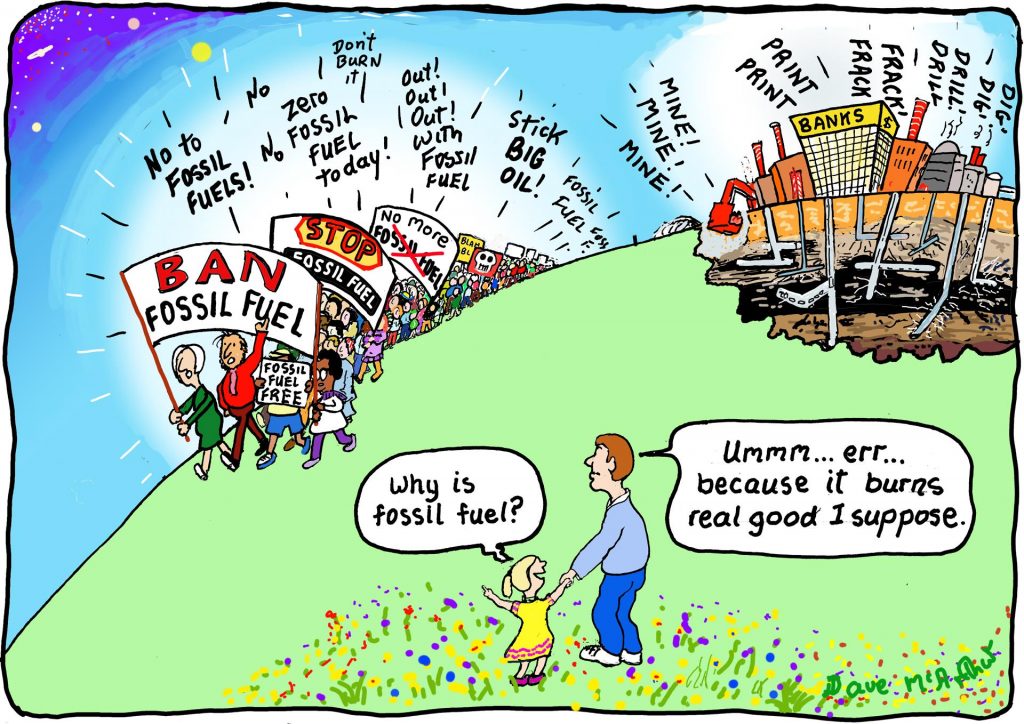
Without compassion, the ego can easily have us adults become our own worst enemy and sometimes it take the inquiry of a child to enable us to transcend our conundrum.
“Mum. Dad. Why is a fossil fuel?” Chances are if you were a parent answering this question you might patiently explain to your child that a fossil fuel is the remains of plants and creatures that lived and died hundreds of millions of years ago that got buried deep in the Earth where these remains were changed into stuff we call coal, natural gas and oil that we can dig up and burn.
You might even preempt your child’s next probable question and explain its good we can burn it because we can use the fires in furnaces and engines to do nearly all our lifting, pushing and pulling these days as well as cooking our food and warming our bodies.
If you answered thus, then it is clear you did not hear the question properly, assumed your child asked “What is a fossil fuel?” and your answer was unhelpful on many levels.
However please enjoy compassion for yourself as we explore why your answer is so unhelpful and could well threaten your child’s very existence. Know that you are in plentiful company – hundreds of millions of people would have given a similar answer and their answers are also informed by the interplay of the fundamental forces of the human psyche. Profound psychology~physics and the fact we are our language inform whatever answer we give.
The Real Dirt on Our Human Condition
There are myriad ways of describing the human condition and none are perfect. A common theme of this series of essays is we can usefully understand our self as being a finite, paradoxical, balance of the universal forces, as are all other existing forms.
To reiterate the fundamental assumptions of this theme in a brief paragraph: our psyche can be understood as the interplay of two complementary dynamic forces, that of the ego (the “I”) and that of compassion.
The ego is an exclusive force, characterized by divisiveness, acquisitiveness, self-deceit, arrogance, know-all and greed.
By comparison, compassion is an inclusive force, characterized by connection, sharing, honesty, humility, inquiry and generosity.
Both forces simultaneously arise in any moment of self-awareness and our existence, our lifestyle and our language are all contingent on a healthy balance of these two forces.
Without sufficient compassion, we become delusional, our lifestyles deny the principles of physics and, in the ultimate, the ego has us self-destruct.
For example, the ego can easily have us mishear the questions of our children about “fossil fuel”, be ignorant of what we are saying, live by price not value and have us burn the precious minerals of Earth as though there is no tomorrow.
With compassion, we hear our children’s questions, treasure our mother tongue, live by value not price and we conserve the precious minerals of Earth for generations to come.
The Wondrous, Precious Carbon Atom
Living matter has persisted on Earth in countless forms at least 3.7, perhaps 4.2 billion years. Each organism, no matter how large or small, primarily consists of four common elements: carbon, hydrogen, oxygen, and nitrogen. For instance, these four elements form 96% of our human body weight and we each exist as an exquisite, finite balance of them plus some sulphur (sulfur), phosphorus and a few other trace elements.
This essay focuses on carbon and our role as Carbon Beings amidst the continuous, universal carbon flux.
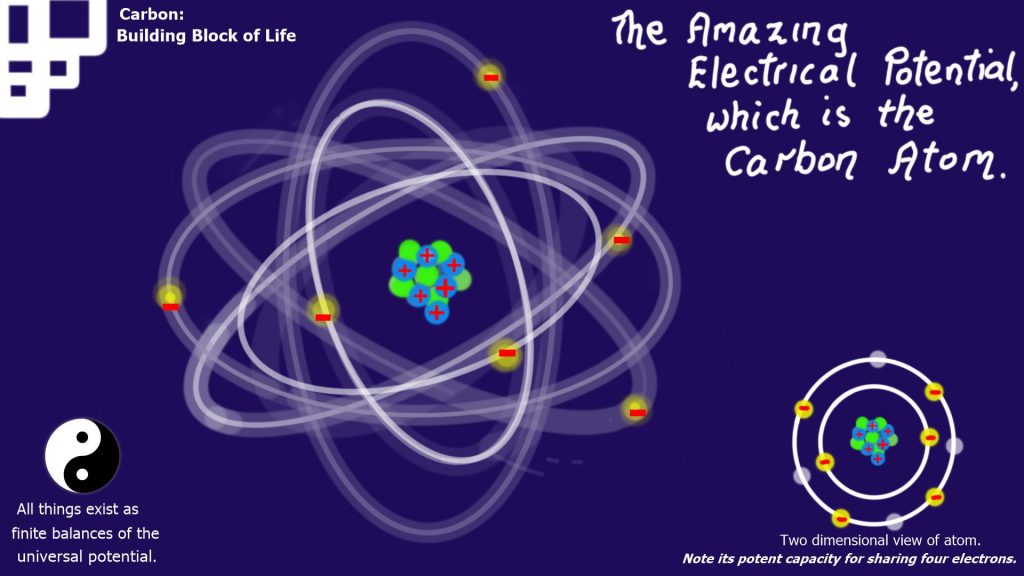
Carbon is a uniquely versatile element because the architecture of its atom enables it to form four bonds with other carbon atoms and with other elements. It can form myriad compounds, more than any other element. Already about 10 million compounds have been described and it composes 45-50% of all dried biomass.
Carbon is most wonderful in that it forms the fundamental building block of most organic life and all organic chemicals are carbon.
Carbon is present in our every breath, in every morsel we eat and in every cell of our body.
Carbon enables quality thermal and electrical insulation so we can store food and use electrical appliances in a wide range of climates. It can even act as a superconductor as well.
So the question arises: surely it is a bit weird that some human beings set up websites calling for a “post carbon” era and a “zero carbon” future? Some even take to the streets with placards proclaiming carbon is bad, malevolent, pollution, a poison.
In brief, carbon is such a stupendous substance that its prevalence and versatility defies summary words though we can experience its amazing bounty with our senses. We can know our carbon potential is truly vast and we abuse it our grave peril. Used with compassion, carbon can enable us to live in sustaining harmony with all.
So Exactly What is a Fossil?
Typically we think of a fossil as something resembling a living form that has been uplifted by tectonic movements or that we dig up from deep in Earth’s crust. Examples include the bones of dinosaurs and ancient shells.
The word “fossil” arises from the PIE root *bhedh- “to dig, pierce.”, giving us the Latin fossilis “dug up,” and by the 1610s the word fossil meant “any thing dug up”. Now this latter definition includes pretty much everything and so it is not very helpful.
And the question arises: does this definition include things not dug up such as the remains of ancient life found embedded in river banks and mountain cliffs? Indeed, can they still be considered minerals i.e. things that are found in our mines in the Earth’s crust?
Typically European people had a common, simple, millennia-old explanation for such phenomena: God , the almighty, playful creator made all sorts of forms just for the fun of it, as proven by the myriad, ever-changing forms of the clouds in the sky. So they considered it quite normal that these stone resemblances of bones, fish skeletons and shells should turn up when ploughing the fields or the river scoured its banks. And it just further proved God’s enormous bounty and great sense of playfulness when climbers discovered rock shells in the heights of the European mountains.
While some Europeans could imagine the oceans once flooding the Earth, very few people could envisage the great continents of Earth moving around the planet, splitting asunder and sub-ducting one another.
From 1736 “fossil” was given what dictionaries describe as a more “restricted meaning” and it was defined as the “geological remains of a plant or animal”. At first glimpse this might seem a more inclusive meaning because it could include fossil movement due to the great tectonic flux of Earth. However the question arises, “ What does “geological” mean?” And here I quote my valuable guide Etymology Online
1795 as “science of the past and present condition of the Earth’s crust,” from Modern Latin geologia “the study of the earth,” from geo- “earth” + logia (see -logy). German Geologie is attested by 1785. In Medieval Latin, geologia (14c.) meant “study of earthly things,” i.e. law, as distinguished from arts and sciences, which concern the works of God. Darwin used geologize as a verb.
https://www.etymonline.com/search?q=geology
We can see the meaning of the word “geology” becomes vastly more exclusive in recent centuries. Prior to the English Combustion Revolution, Men (human beings) were seen as generally being students of the human condition and part of the cosmos. Subsequently “geology” pertained to “geologists” – a limited group of people who are experts on the nature of the Earth’s crust.
This ego-derived depreciation of our roles as stewards amidst the universal flux is consistent with the radical change in English behaviour i.e. the advent of the English Combustion Revolution. It is typical of a widespread syndrome: our English language is stripped of it essential humanity and we project the consequences of our actions onto esoteric, passive academic disciplines i.e. bodies of knowledge that we call “archeology”, “geology” and “mineralogy”. Verbs are transmuted into nouns and vice versa in this psychopathic process.
Animal, Vegetable or Mineral?
Mention of mineralogy gives rise to the question, “Is a fossil actually a mineral?”
Many of us parrot the phrase, “Animal, Vegetable or Mineral” without thought or question. This may be because many people believe the BBC is The Authority on all things. It used to broadcast a programme with this title for many years and its producers basically defined a mineral as a “dead thing”.
A quick search for the definition of “mineral” reveals much confusion:
Mineral(n.)
late 14c., “substance obtained by mining,” from Old French mineral and directly from Medieval Latin minerale “something mined,” noun use of neuter of mineralis “pertaining to mines,” from minera “a mine” (see mine (n.1)).Meaning “material substance that is neither animal nor vegetable” is attested from early 15c. The modern scientific sense (“inorganic body occurring in nature, homogeneous and having a definite chemical composition and certain distinguishing physical characteristics”) is by 1813.
https://www.etymonline.com/search?q=mineral
This Etymology Online discussion indicates the use of the word “mineral” has evolved from a specific activity into a generality that is meaningless.
At the same time the official definition of mineral has become so exclusive that it too is almost meaningless when trying to make sense of the phrase, “fossil fuels”.
For instance, check out this statement
Many people may not be aware of this, but there is a fairly precise definition of what constitutes a mineral. A mineral is an element or chemical compound that is a periodic crystal, has an incommensurate structure, or is in an amorphous phase; all of these have to be formed naturally, as the result of a geological process. New research that appeared in the current issue of Science may force mineralologists to change that definition to include what are known as quasicrystals.
https://arstechnica.com/science/2009/06/animal-vegetable-or-not-quite-mineral/
And What’s Natural about Natural?
Now the question arises: “Is “natural gas” a crystal?” and what do we learn? It seems there there is stuff known as “methane hydrates” at the bottom of the oceans and under the Arctic tundra. To quote CNN Money:
The crystals are formed when methane gas, which results from the natural decomposition of animals and plants, comes into contact with water at just the right temperature and pressure” … “they’re estimated to hold twice as much carbon as all the known reserves of oil, coal and natural gas combined.
https://money.cnn.com/2010/03/09/news/economy/nat_gas_crystals/
“The potential is enough to power humanity from now until the asteroid hits…”
This suggests “fossil fuels” in the form of “natural gas” are also generated on top of Earth’s crust and the idea men can “dig” water is hilarious. Digging holes soaking wet sand is enough exercise in futility.
Perhaps like me, you are also reminded in a question that has perplexed me since childhood “Why do adults describe gas that comes out of the ground as “natural gas” and, for that matter, “Why do Americans describe liquid petroleum as “gas”?
I have long wondered at the mind-set of anyone who believes that the atmospheric gases that sustain our crops, refresh our waters and vitalize our breath are, by definition “unnatural gases” or “not-natural gases”. Such beliefs are baffling, especially when they are propagated by our leading professors and top “Energy Experts”.
Lets Try Get Out of this Rabbit Hole, Worm Hole or Whatever It Is
Yes, we may seem to have gone down the proverbial “rabbit hole” (a weird, bizarre, nonsensical place) or through a “wormhole” (to some alternative, seeming screwed-up universe.) We certainly haven’t gone down a simple mine-shaft into Earth’s crust in our pursuit of learning what a fossil or a mineral is.
So much for the diagrams of shells and dinosaur bones deep in the layers of Earth’s crust being formed into “fossil fuels” such as mineral oil~gas.
So much for the highly-rated Energy Sector and University educational websites.
So much for our Crown dialect of English with all its Merchant-Banker Speak. Their definitions are about as clear as the killer smogs and pollution of the English Combustion Revolution and they blind us to our misuse and abuse of Earth’s crust, oceans and atmosphere.
So let us instead trust to the wisdom of the great principles of physics, for they most truly advise us of the ways of the universe and enable us to transcend the narrow dictates of the ego.
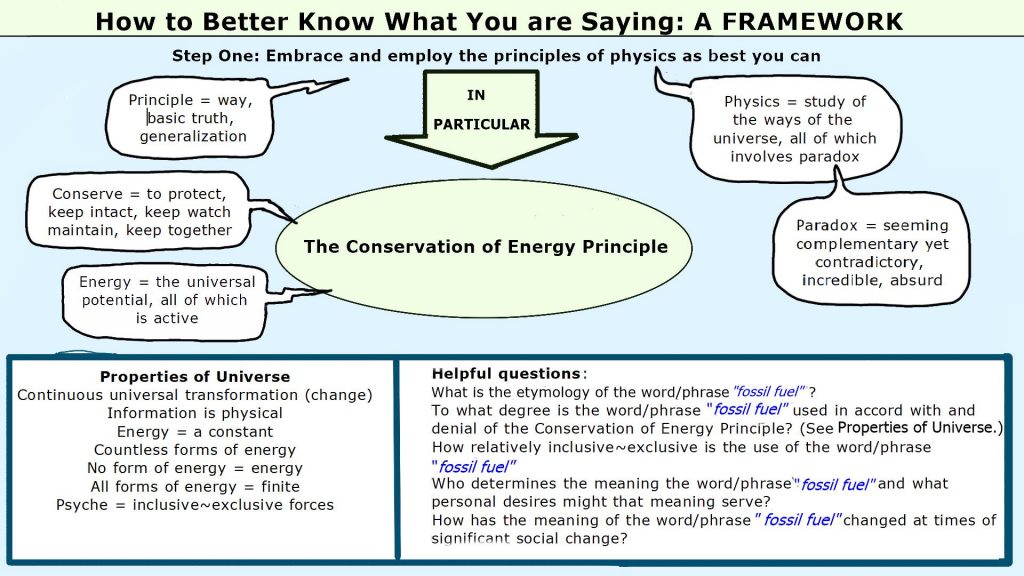
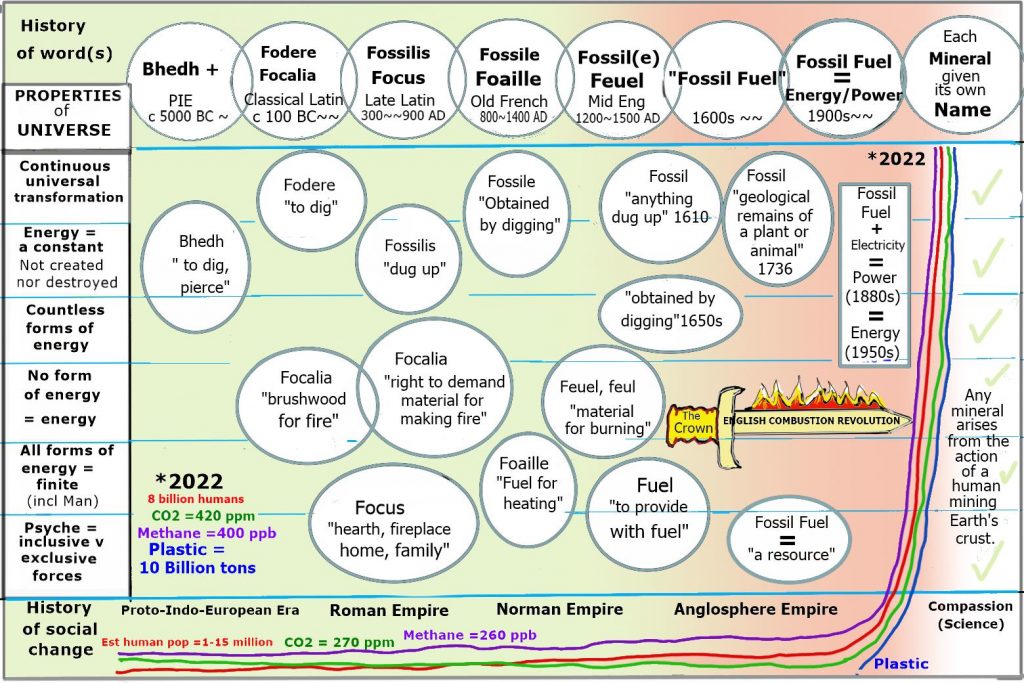
Perhaps it is time to embrace the relative wisdom of the English language of our ancestors again. For a start let us associate the word “ minerals ” again with our actions, with what we do actually doing. What are we doing? We are mining i.e. we are digging holes or mines in the Earth’s crust and extracting stuff. Minerals are stuff we mine and we mine to get many types of stuff out of Earth’s crust with each category of mineral having its own name.
For instance, we mine for coal, petroleum (oil from rock formation), inflammable gas (e.g. methane), diamonds, iron, cobalt, nickel, silver, gold lithium, water, you name it.
Many plants and other animals also mine and extract minerals though probably none do so on the same scale that we human beings do. This said, some plants have developed far more sophisticated mining methods than us. They can mine vital chemicals in Earth’s crust to a depth of nearly 400 feet with exquisite, sustainable precision and then incorporate these mineral compounds into their bodies in ways that make the question “Animal, Vegetable or Mineral?” impossible to answer.
So what do we really know ?
We know this celestial ball of rock we call Earth has existed billions of years in its current dynamic state consisting of various layers of forms of solids, liquids and gases.
Earth’s surface has been a semi-frozen slush ball during some of its eons and largely tropical during others of its eons. Super-continents have formed, split apart and dissipated yet somehow life forms have prevailed for perhaps 4 billion years or more. However life, as we know it, in the form of animals and fish has existed for a small fraction of that time and even now they form a small portion of the life forms on Earth.
Countless trillions of tons of biomass in the forms of algae, plants and bacteria have lived, died and been subducted deep into Earth’s crust during the past four billion years, leaving no semblance that they existed because, over eons, the heat and pressure of Earth radically transformed their chemistry.
It is important to understand this because algae, plants and bacteria form the vast bulk of what many people call “fossil fuels” and yet any visible resemblance of their original, ancient life-form has long ceased to exist. Liquid and gaseous semblances of life-forms are very fleeting.
It is also helpful to understand the remnants of dinosaur bones, shells and fish that people commonly think of as “fossils” are now actually petrified semblances of life. i.e. they are now non-inflammable pieces of rock.
The almost certain truth is we are not burning the fossil remains of dinosaurs or ancient fish when we start a car motor or fire off in a rocket to the moon. There’s a neat little video discussing this at
https://www.britannica.com/story/do-fossil-fuels-really-come-from-fossils
The reason it is important to learn if we are talking nonsense about fossils is because it could well being imperiling humankind. And that risk to us all increases exponentially if we are also talking nonsense about what a fuel is.
So What and Why is a Fossil Fuel?
This question might make your brain hurt at first glance. It actually is two questions rolled into one. I will try to make sense of this mind-boggling topic in three or four paragraphs. Let us start unraveling them by checking out Etymology Online:
fuel (n.) c. 1200, feuel, feul “fuel, material for burning,” also figurative, from Old French foaille “fuel for heating,” from Medieval Latin legal term focalia “right to demand material for making fire, right of cutting fuel,” from classical Latin focalia “brushwood for fuel,” from neuter plural of Latin focalis “pertaining to a hearth,” from focus “hearth, fireplace” (see focus (n.)). Figurative use from 1570s. Of food, as fuel for the body, 1876. As “combustible liquid for an internal combustion engine” from 1886. A French derivative is fouailler “woodyard.” Fuel-oil is from 1882.
https://www.etymonline.com/search?q=fuel
First observe how “fuel” arises from “focus” meaning “hearth, fireplace“. Indeed focus used to mean “fire” in post-classical times. This is both intriguing and fascinating because it may speak volumes about our current conundrum for reasons I will briefly allude to later.
Also observe how for the past millennium “ material for burning,” has been called fuel (feuel, feul), similarly the Old French word foaille pertained to “fuel for heating,“
Typically trees were the “ material for burning” until the advent of the English Combustion Revolution when coal became the prime material for burning. Also known as the English Industrial Revolution, it involved the adoption of the radical belief that any activity is good if it maximizes short-term profits for the Crown (the City of London Merchant Bankers). This includes burning on scale all the combustible forms of biomass in and on Earth’s crust.
We are our language and this insane belief is reflected in the Crown dialect of English. The first known use of the term “fossil fuel” is in the work of the German, Casper Neumann. This was published in 1759, forty four years after his death. The term became more popular in the early 1800s as the English Combustion Revolution gained momentum, the English Empire expanded and the Crown dialect of English reflected this syndrome.
For instance, about this time the Crown redefined the word “resource” as anything that means wealth to the Crown merchant bankers and now this encompassed whole-scale combustion of all biomass. Prior to this, “”resource” referred to something that arises again and again, as in “resurgere”. Even then it was known that coal does not arise again once we have burned it. So it was that “the fossil fuels resource” became the “means of raising money and supplies” and prime driver of the expansion of the English~Anglosphere Empire and the so-called “English Industrial Revolution”.
Finally and most important, observe how “fuel” arose from the French word foaille meaning “fuel for heating,” , which arose from the Medieval Latin legal term focalia “right to demand material for making fire, right of cutting fuel…”
In other words, fuel was associated with rights and privileges prior to the English Combustion Revolution. The Crown Merchant Bankers completely stripped such moral concerns and considerations from the word “fossil fuel” and “resource”.
The behaviour and language of the Crown became exponentially more psychopathic in the 20th Century when they then conflated and equated “fossil fuels” with both “power” and “energy” so that the Anglosphere Empire is now founded in the delusional equation “Energy = Fossil Fuels = Power = Electricity = Bulk-generated Electrical Products”.
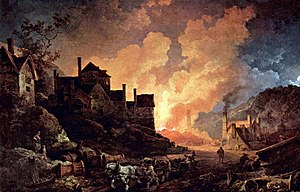
See my other essays in this series in which I discuss the nature of energy , power, warming and economy plus explain why our Crown dialect of English is fatally flawed, how it reflects~generates beliefs and behaviour that are in complete denial of the principles of physics. The dialect forms a sure recipe for dystopia and probable self-extinction.
For example, whereas the word for fuel (“focus“) might once have reminded us in the family hearth and the currency of family, it now has us obsess about the Earth’s crust and monetary currency at the expense of all else.
For example, the conflation of “energy” and “fossil fuels” as in Energy = Fossil Fuels conveniently omits the atmosphere from the combustion equation (Energy = Fuel plus Oxygen) with all its reminders of waste and pollution.
The Value of Mineral Oil~Gas and Coal in a Word.
You may be now asking “How the hell could any man (human being) be so stupid as to believe a chunk of coal or a cup of petroleum is energy?” After all, energy is the universal potential – it is the very vitality and bounty of the whole, vast universe.
All the evidence points to such a crazy delusion as being another ingenious deceit of the ego. This element of our psyche perceives the Conservation of Energy with its wise reminders of the finite nature of all things, including human beings, as an existential threat. It would have us believe we are the law unto ourselves.
Without the moderating force of compassion, the ego can easily have us put a price on every thing and yet know the value of no thing. It can have us act in most perverse ways.
For instance it can have us extol that cup of petroleum as “energy” i.e. the vital, unspeakable animation of all existence. At the same time the ego can have us price that same cup of petroleum at 8 cents ($US50 a 42 gallon barrel) and burn it as though there is no tomorrow. It can have us scream blue bloody murder if someone dares price it at 16 cents even as we happily hand over $5 for a cup of coffee. It can have us feel any price over a few token cents or pence a cup of mineral oil is a gross infringement of our divine right to burn it as we please. After all, it is a “fossil fuel”, which means it exists to be burned, or so the ego would inform us.
With the moderating force of compassion, we experience awe and wonder at the potential of that lump of coal, that tank of mineral gas, that cup of mineral oil.
For instance, we feel awe at the myriad, ancient organisms that lived and died over hundreds of millions of years and now form the biomass in the cup.
We experience wonder as we try and fail to imagine the hundreds of millions of sunrises involved in the creation of this life-form.
We feel humility at the eons of unimaginable tectonic forces and temperatures required to transform the organisms into petroleum.
We feel immense gratitude that this substance exists with all its vast potential to be manifest as devices that sustain our children with quality food, shelter, water, heating and other vital needs for hundred of thousands of generations to come.
We feel pain as we glimpse in this cup of petroleum its capacity to perform forty man-hours of fulsome labour and sorrow if we converted over 99% of that amazing potential into waste heat and pollution by burning it in cars and jets.
We feel tenderness and kindness for ourselves if we realize we have been so deluded that we have squandered such a precious substance and converted its sustaining potential into deadly wars and lethal pollution.
We enjoy a spirit of inquiry and the generosity to give time to knowing what we are saying so our language better sustains us.
The Value of Mineral Oil/Gas and Coal in a Word: Priceless?
These brief reflections on our use of the phrase “fossil fuel” suggest aspects of our behaviour and language are very ego-driven and unsustainable. In particular, the description of mineral oil/gas and coal as “fossil fuel” indicates a wilful ignorance in Anglosphere culture of tectonic dynamics. Worse, the legislated equation of these minerals with “energy”, “power” and “electricity” is clear evidence of a profound denial of the principles of physics. This is characteristic of the ingenious trickery of ego. Without sufficient compassion, the ego can easily subvert the best intentions and messages of people protesting against Human-induced climate change and cause them to become their own worst enemy. So, for instance, they march against the combustion of these minerals and yet proclaim them to be “fuels”.
The ego thrives in this climate of confusion and wanton ignorance of its own making. Thus it becomes very easy for the ego to have us flick on a switch or tap so we can burn them in a trice of a trice while remaining oblivious to the fact that these substances were generated over billions of years in unique tectonic and climatic conditions that may never occur again in the life of our planet.
At the same time, when performed in compassion, these brief reflections remind us in wonder and awe of the rare and precious nature of these minerals, these materials we extract from Earth’s crust.
Compassion reminds us in the interconnection of all things, including our roles as stewards of the flows and balance of carbon that sustain humankind long term.
Compassion enables us to appreciate the ancient origins and potent nature of these carboniferous and solariferous substances, to value the countless photosynthetic organisms and trillions of watts of sunshine in mineral oil/gas and coal.
Compassion enables us to listen to The Earth, to be humble and speak truthfully – we acknowledge these materials are formed over eons and we only mine them. So we call them minerals to remind ourselves that men do not create, produce or generate them. We only extract them from Earth’s crust. And we remain mindful that our use them impacts the carbon flows and balance in all the soils, oceans and airs of planet Earth.
Compassion enables us to conserve and share for generations to come.
Afterword
My last ten days have largely been given to praying for guidance from the universe and waiting for meaningful words to occur so this essay might end in true hope. It is a profound topic. After all, our whole Anglosphere Empire and all its main currencies are based on an obsession with mining and the fatal delusion that mineral biomass is “fossil fuel”. Some people, a small but influential minority, are so addicted to burning it for private gain and prestige that they will risk major ecological disruption and nuclear holocaust in their endeavours to fuel their insatiable desires.
It so happens today, as I write this, my motorbike and motor car driver’s licence comes up for renewal. Part of me has dreaded the idea of not renewing it. Just having my licence in my pocket has provided a sense of security. I do not have a passport and it is my only other recognized means of identification in New Zealand. It also means I can leap in a car or on a motor bike if I should ever so choose. Not that I bought a car since 1991 and I have flown just two short jet-hauls since 1991 and they were over 20 years ago. So I know I have reduced my carbon emissions from transport by 90% in that time. Nonetheless its not easy shedding 60 years of comfortable and commonly shared beliefs in New Zealand about our entitlement to own and drive cars.
However these deeper, more compassionate reflections today about our wasteful, destructive combustion of these rare, potent minerals have reassured and refreshed me in awe and wonder, especially as I hear the distant shouts and laughter of the children at my local school. The decision not to renew my driver’s licence today now fills me with a sense of liberation. Life will be even more joyous.
Essays in this series:
Medium part 1 Tongue-tied by the English Language
(On untying the bonds of the mother tongue)
Medium part 2 What’s in a Word?
Medium part 3 What is Energy?
Medium part 4 What is Power?
Medium part 5 What is Economy?
Medium part 6 What is Warming- Up?
Medium part 7 What is a Fossil Fuel?
Medium part 8 What is a Resource?
Medium part 9 What’s with The Ego~Compassion
This series of essays is also posted on Medium.com under my name Dave McArthur
